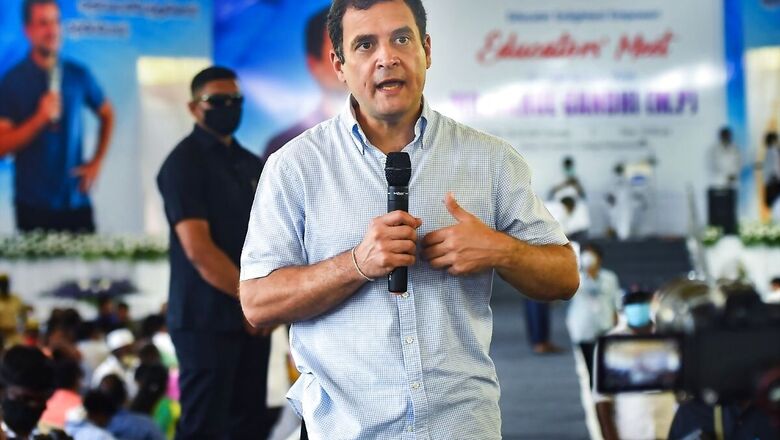
views
On the last day of campaigning for the assembly polls in Kerala on Sunday, Congress leader Rahul Gandhi visited the Thirunelli temple in Wayanad, his Lok Sabha constituency.
Clearly, the Congress needs all help it can get to return to power in the 140-member Kerala assembly, and to script a turnaround in electoral politics.
Gandhi knows that. He has extensively campaigned in Kerala for the Congress-led United Democratic Front (UDF), which will bank on history to script the much-needed victory. The state has traditionally changed its government every five years.
Going by that, the Congress has a real chance to oust the Left Democratic Front (LDF), boost the sagging morale of its workers in Kerala and elsewhere, and, to some extent, silence critics within and outside the party.
In case of a win in Kerala, the Congress will be in power in a sixth state, alongside Punjab, Rajasthan, Chhattisgarh, Maharashtra and Jharkhand (it is part of the ruling coalition in the last two).
But the April 6 elections won’t be a cakewalk. For chief minister Pinarayi Vijayan remains a popular figure despite debates over anti-incumbency. His government’s handling of the Covid outbreak during its initial days and management of the floods have earned him praise. He has also undergone an image makeover: from a rugged version to a much milder avatar.
The Congress knew it had to move swiftly in Kerala to pose a strong challenge. And it did, kicking off the campaign quite early with Gandhi leading the charge.
Then, Gandhi’s north-south remark did trigger a controversy; in February, he said at a public event that he found Kerala “refreshing” because people here were “interested in issues”. That statement was an attempt to strike a chord with voters of the state that sent him to Parliament after the “first 15 years” in the north, where Gandhi said he got used to a “different type of politics”.
His indication that politics was more meaningful in Kerala was also aimed at cultivating an image that he now belonged to the south, where local leaders have expressed concerns that northern culture is being forced on them. A visible change in Gandhi was his attire; he seems to have shed the north Indian kurta-pajama for trousers and shirts, which have a wider appeal.
Not going into the argument over where all the Congress has a fighting chance in the current round of assembly elections, the results in Kerala will have a big impact on the political career of Gandhi, who led from the front here. In the 2019 Lok Sabha elections, his party won 15 of the 20 seats in the state. Critics will blame a poor performance in the assembly polls on him more than anyone else.
But at the same time, the Congress has its own problems; infighting being the most prominent of them. KC Venugopal, Congress general secretary incharge of organisation, is trusted by Gandhi but not acceptable to the Kerala unit. There appeared to be a tug of war between former CM Oommen Chandy and Ramesh Chennithala. But the apprehension that Venugopal, a Rajya Sabha member, could be Gandhi’s choice has made the two come together. Also, there have been dissent among those denied tickets. These divisions in the Congress could prove to be major obstacles, and have in the past played spoilsport for the party in many other states.
Amidst the many voices in the Congress — some demanding reinstatement of Gandhi as the Congress president and some asking for wide-ranging reforms — a loss in Kerala will put him in a difficult spot and question his credentials to take up the top job in the party once again.
In 2019, after the rout in the Lok Sabha elections, and after being defeated in his family bastion of Amethi, Gandhi stepped down from the Congress president’s post. That time, northern Kerala’s Wayanad, a traditional Congress stronghold, was the only silver lining for him. It remains to be seen if Kerala will come to his rescue again.
The group of 23 (the 23 leaders who wrote to interim president Sonia Gandhi for organisational reforms) is waiting in the wings. Many of them are silently waiting for the outcome on May 2. In their August letter, they blamed the state of flux in the party as being responsible for its repeated electoral defeats.
Gandhi’s failure to deliver in Kerala would make it difficult for his leadership to be accepted within his own party, while knives will be out in the rival camps. On the other hand, a win will cement his position before 2024, drown the voices of dissent and bolster those desperate to see him back in the saddle.
For Gandhi, the most-important questions now are: if not Kerala, where? If not now, when?
Read all the Latest News, Breaking News and Coronavirus News here. Follow us on Facebook, Twitter and Telegram.




















Comments
0 comment